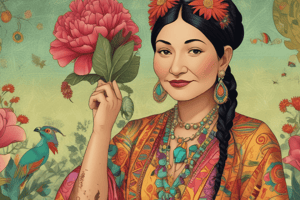Podcast
Questions and Answers
What did the Chicano movement fight for?
What did the Chicano movement fight for?
- Equal rights
- Equal education
- Equal jobs
- All of the above (correct)
What were the roots of the Chicano movement?
What were the roots of the Chicano movement?
Mexican Americans have been fighting against discrimination for almost half a century.
What are grassroots campaigns?
What are grassroots campaigns?
An organization that does face-to-face campaigns for advocacy groups.
What is Chicanismo?
What is Chicanismo?
What did the 1947 Mendez v. Westminster case rule?
What did the 1947 Mendez v. Westminster case rule?
What was the outcome of the 1954 Hernandez v. Texas case?
What was the outcome of the 1954 Hernandez v. Texas case?
What did El Plan Espiritual de Aztlán highlight?
What did El Plan Espiritual de Aztlán highlight?
What did youth movements focus on?
What did youth movements focus on?
What was the main goal of farmworkers in the Chicano movement?
What was the main goal of farmworkers in the Chicano movement?
What does 'Sí, se puede!' mean?
What does 'Sí, se puede!' mean?
Who was Cesar Chavez?
Who was Cesar Chavez?
What did Reies López Tijerina focus on?
What did Reies López Tijerina focus on?
What was Rodolfo 'Corky' Gonzales known for?
What was Rodolfo 'Corky' Gonzales known for?
What role did Dolores Huerta play in the Chicano movement?
What role did Dolores Huerta play in the Chicano movement?
What is El Teatro Campesino?
What is El Teatro Campesino?
What was the purpose of MAYO, founded by José Angel Gutiérrez?
What was the purpose of MAYO, founded by José Angel Gutiérrez?
Who was Ruben Salazar?
Who was Ruben Salazar?
Flashcards are hidden until you start studying
Study Notes
Chicano Movement Overview
- A social and political movement advocating for the rights of Mexican Americans and Latinos during the 1960s and 70s.
- Addressed systemic discrimination as part of the broader civil rights movements.
Goals of the Movement
- Focused on achieving equal rights in education, employment, and housing.
- Fought against discriminatory practices and social inequalities.
Historical Context
- Roots stretch back nearly fifty years, with Mexican Americans actively fighting against discrimination prior to the Chicano movement.
- Emerged from a long history of self-defense and advocacy for civil rights.
Activism Strategies
- Grassroots campaigns utilized direct, face-to-face advocacy to mobilize community support.
- Organized boycotts against businesses that upheld segregation and discrimination.
Cultural Connection
- Emphasized cultural identity by linking Mexican Americans to Aztlán, the legendary homeland of the Aztecs.
- Chicanismo emerged as an expression of pride and cultural identity among Chicanos.
Landmark Legal Cases
- 1947 Mendez v. Westminster: Unconstitutional ruling against the segregation of Latinx students.
- 1954 Hernandez v. Texas: Affirmed equal protection under the 14th Amendment for Mexican Americans.
Notable Events and Plans
- El Plan Espiritual de Aztlán (1969): A significant gathering to strategize on unity, self-defense, and liberation from Anglo dominance.
Youth Involvement
- Young activists concentrated on educational reform and demonstrations against the Vietnam War, advocating for equal learning conditions.
Farmworkers and Labor Rights
- Advocated for labor rights, focusing on farmworkers' conditions.
- The United Farm Workers of America (UFW) was formed to fight for labor equality.
Key Figures
- Cesar Chavez: Prominent activist and co-founder of UFW, worked towards equality for Mexican Americans.
- Reies López Tijerina: Advocated for land rights and revealed the struggles of Latino and Native communities in New Mexico.
- Rodolfo "Corky" Gonzales: Known for raising awareness and founding the "Crusade for Justice" to support Chicano rights.
- Dolores Huerta: Key organizer in labor rights and feminist movements, worked alongside Chavez in UFW.
- Luis Valdez: Created "El Teatro Campesino," a theater promoting the farmworkers’ struggles and energizing activism.
- José Angel Gutiérrez: Co-founded MAYO to promote social change and cultivate leadership among young Chicanos.
- Ruben Salazar: First prominent Mexican American journalist highlighting Chicano issues in mainstream media.
Key Motto
- "Sí, se puede!": A rallying cry for the UFW and the Chicano movement, symbolizing perseverance and empowerment.
Studying That Suits You
Use AI to generate personalized quizzes and flashcards to suit your learning preferences.




